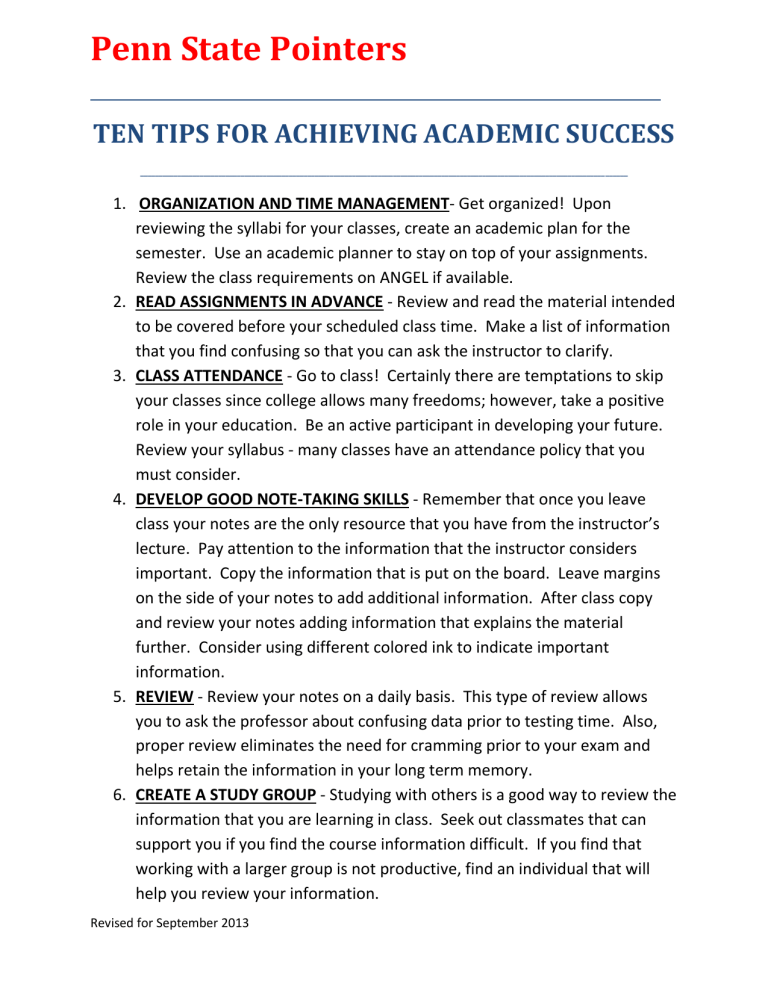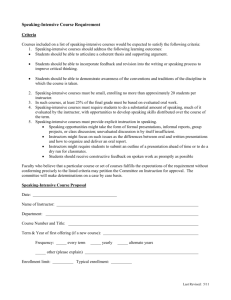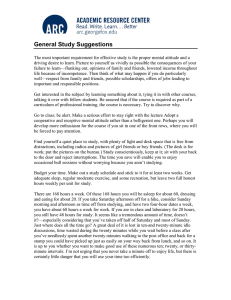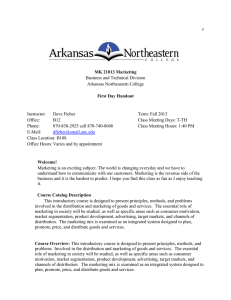The 10 Tips for Academic Success

Penn State Pointers
______________________________________________________________________________________________________________________________
TEN TIPS FOR ACHIEVING ACADEMIC SUCCESS
___________________________________________________________________________________________________________________________________
1.
ORGANIZATION AND TIME MANAGEMENT- Get organized! Upon reviewing the syllabi for your classes, create an academic plan for the semester. Use an academic planner to stay on top of your assignments.
Review the class requirements on ANGEL if available.
2.
READ ASSIGNMENTS IN ADVANCE - Review and read the material intended to be covered before your scheduled class time. Make a list of information that you find confusing so that you can ask the instructor to clarify.
3.
CLASS ATTENDANCE - Go to class! Certainly there are temptations to skip your classes since college allows many freedoms; however, take a positive role in your education. Be an active participant in developing your future.
Review your syllabus - many classes have an attendance policy that you must consider.
4.
DEVELOP GOOD NOTE-TAKING SKILLS - Remember that once you leave class your notes are the only resource that you have from the instructor’s lecture. Pay attention to the information that the instructor considers important. Copy the information that is put on the board. Leave margins on the side of your notes to add additional information. After class copy and review your notes adding information that explains the material further. Consider using different colored ink to indicate important information.
5.
REVIEW - Review your notes on a daily basis. This type of review allows you to ask the professor about confusing data prior to testing time. Also, proper review eliminates the need for cramming prior to your exam and helps retain the information in your long term memory.
6.
CREATE A STUDY GROUP - Studying with others is a good way to review the information that you are learning in class. Seek out classmates that can support you if you find the course information difficult. If you find that working with a larger group is not productive, find an individual that will help you review your information.
Revised for September 2013
7.
STRATEGIES FOR STUDYING FOR EXAMS - Check your syllabus or ask the professor to determine what type of exam you are going to be taking. Find a study space that is conducive to your study style. When studying, concentrate on the information that you find confusing. Make note cards to help you review material that you must know.
8.
TEST TAKING - First, read the directions carefully. Make sure to preview the test to consider the amount of time needed on each section. Complete the questions that you are certain of the answers first; then, go back to complete the remaining questions. Finally, review the test to make sure that your answers are as you want them and that you have completed each question.
9.
IMPROVE YOUR WRITING SKILLS - When writing a paper for a class, make sure that you understand the professor’s guidelines and requirements for the paper before you begin writing. Make an outline if this is useful. Have someone proofread your drafts in advance so that you can make proper revisions. Remember, writing is a process and should be done in stages.
10.
GET TO KNOW YOUR PROFESSORS - Ask for clarification of confusing material during or after class. Visit your instructor during their office hours for further review. Make sure they know who you are!
Revised for September 2013









